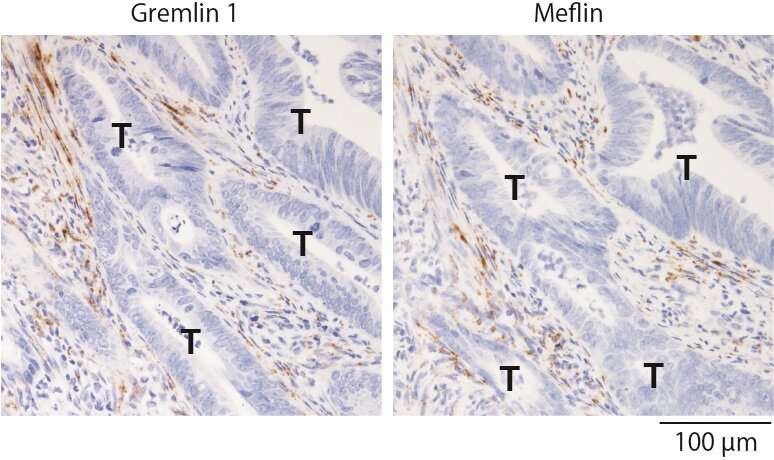#Study finds potential therapeutic targets to inhibit colorectal cancer progression

“#Study finds potential therapeutic targets to inhibit colorectal cancer progression”

Nagoya University researchers and colleagues have revealed that colorectal cancer tissues contain at least two types of fibroblasts (a type of cells found in connective tissue), namely, cancer-promoting fibroblasts and cancer-restraining fibroblasts, and that the balance between them is largely involved in the progression of colorectal cancer. Their findings, recently published in the journal Gastroenterology, suggest that artificially altering the balance between the two types of cells could curb the spread of colorectal cancer tumors, which may become an effective strategy for preventing cancer progression.
Cancer tissues comprise both cancer cells and non-malignant cells such as fibroblasts. Previous studies have suggested that the proliferation of fibroblasts is largely involved in the progression of colorectal cancer, the most common cancer in Japan. Fibroblasts within cancer tissues, called cancer-associated fibroblasts (CAFs), are considered to be divided into at least two populations: those that promote cancer progression and those that restrain it. Impeding the function of cancer-promoting CAFs could be a promising method to prevent cancer progression, but a lack of understanding of the mechanism underlying heterogeneity of CAFs has hampered its development.
In normal colon tissues, proteins called bone morphogenetic proteins (BMPs), which are secreted by stromal cells, are known to play a critical role in regulating intestinal homeostasis, whereas in cancerous colon tissues, they are considered to be associated with cancer progression. In this context, the research team led by Professors Atsushi Enomoto and Masahide Takahashi of the Graduate School of Medicine at Nagoya University in Japan conducted a study to determine how stroma cells lead BMPs to be involved in the progression of colorectal cancer.
The team first analyzed comprehensive gene expression profiling data to identify BMP-related genes that are specifically expressed in colorectal CAFs. Two types of proteins, meflin and gremlin 1, were identified to be encoded by such genes. Next, to investigate the relevance of these proteins in colorectal cancer progression, Prof. Enomoto and his colleagues, who had previously shown that meflin plays a role in restraining the progression of pancreatic cancer, conducted a study in collaboration with researchers from the University of Adelaide and the South Australian Health and Medical Research Institute, who have conducted studies focusing on the role of gremlin 1 as a BMP inhibitor in the intestine.
The joint research group examined the prognostic significance of the expression of meflin and gremlin 1 in colorectal cancer patients and found that, interestingly, those with a high expression of meflin have a favorable prognosis, whereas those with a high expression of gremlin 1 have an unfavorable prognosis. In addition, experiments using a mouse model revealed that the proliferation of colorectal cancer cells can be suppressed through administration of a gremlin 1-neutralizing antibody or overexpression of meflin.
Regarding the role of BMP signaling mediated by stromal gremlin 1 and meflin in colorectal cancer, Prof. Enomoto explains, “We hypothesize that CAFs mediated by gremlin 1 promote cancer progression by decreasing BMP signaling, whereas CAFs mediated by meflin restrain the growth of the cancer by reinforcing BMP signaling.” Therefore, intensifying stromal BMP signaling, either by using a gremlin 1-neutralizing antibody or by overexpressing meflin, could be an attractive therapeutic strategy to treat colorectal cancer.
Scientists have identified the presence of cancer-suppressing cells in pancreatic cancer
Hiroki Kobayashi et al, The balance of stromal BMP signaling mediated by GREM1 and ISLR drives colorectal carcinogenesis., Gastroenterology (2020). DOI: 10.1053/j.gastro.2020.11.011
Citation:
Study finds potential therapeutic targets to inhibit colorectal cancer progression (2021, February 1)
retrieved 1 February 2021
from https://medicalxpress.com/news/2021-02-potential-therapeutic-inhibit-colorectal-cancer.html
This document is subject to copyright. Apart from any fair dealing for the purpose of private study or research, no
part may be reproduced without the written permission. The content is provided for information purposes only.
If you liked the article, do not forget to share it with your friends. Follow us on Google News too, click on the star and choose us from your favorites.
For forums sites go to Forum.BuradaBiliyorum.Com
If you want to read more Like this articles, you can visit our Science category.



